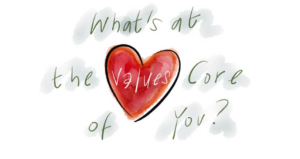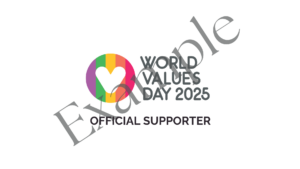Organisations usually have no problem working out what values they should have. They spend a lot of time and effort planning, consulting, holding meetings, writing reports, maybe even conducting an internal survey.
Then they put up these values chosen with such care on the wall in big letters somewhere in the reception area, talk about them in the Annual Report, spend time telling all the staff and stakeholders about them.
What great values they are! Everybody agrees that they are just what’s needed. Everybody feels good. Job done.
And they probably are great values. They probably are exactly the right ones. But then what happens?
Gradually they slip away. Everyone is so busy, so many pressing things to attend to. It’s hard to remember what happened last week, let alone what that values stuff last month was all about. Was it last month, or was it last year?
After a while nobody can remember what they are. When they walk past reception now, the values are just part of the wallpaper, and paid as little attention.
It happens everywhere. Values are easy to talk about, and not difficult to do, but hard to keep on doing consistently day after day. This is the Values Gap. The gap between the values once so eagerly aspired to, and what is actually happening now, on the ground.
That’s why the UK Values Alliance, the RSA, PwC and the Forward Institute decided to put together a one-hour exercise called the Values Challenge for World Values Day this year, to give us all a bit of a wake-up call, whichever group or organisation we belong to. It is a fun and easy-to-run workshop which will bring everyone together and re-invigorate the practice of values within an organisation.
The Values Challenge starts with a lively RSA Animate clip of a Simon Sinek talk emphasising the need for consistency as well as intensity in tackling any issue such as values. Just like brushing your teeth, you have to brush them not just once but every single day. Otherwise nothing happens, it doesn’t work. It’s by the “accumulation of things, done over the course of time, repeatedly” that those values get really embedded in the organisation over time.
After this clip, the participants identify one of their organisations values, the one they feel is in most need of attention. They ask themselves how the practice of that value could be improved.
Then they agree one single simple action that they can all do to make that value come to life again in the group or organisation. The action doesn’t need to be bold, or ambitious, or complicated. Best if it’s easy for everyone to do…and to keep on doing.
There is no need for any outside facilitator or any complicated equipment to run the session. The Values Challenge pack comprises a set of slides and a short manual which explains clearly how to run the one-hour session. This is all you need.
There are versions of the Values Challenge for community groups (such as clubs, youth groups or volunteer groups) and schools, as well as for organisations. There are activities suggested for individuals too, so that they can take part in the Challenge in a less structured and more informal way. The relevant resources for all these are now available for immediate download from the World Values Day website.
About The Author
Charles Fowler is part of the UK Values Alliance steering group and was heavily involved with other members of the Alliance in launching the first World Values Day last year. He is also Chair of the Human Values Foundation, which helps children and young people discover and practise values.
Resources
- See the previous blog in the series, by Matt Stephens
- See the next blog in the series, by Anna Laycock of Finance Innovation Lab.
- See the full list of blogs at www.worldvaluesday.com/blogs
- Participate in the Values Challenge this year! Follow these links for organisations, for community groups, for schools, or for individuals.
- For more inspiration, follow us on social media: LinkedIn | Twitter | Facebook | Instagram







